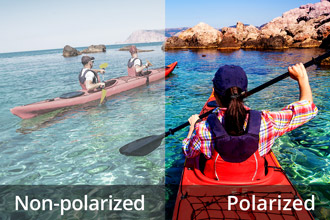Benefits of polarised glasses

Polarised sunglasses have been popular for years with boaters and people who enjoy fishing because these lenses greatly reduce reflected glare from the water. Now many others who spend time outdoors have discovered the benefits of polarised lenses.
Besides boaters, outdoor enthusiasts who benefit the most from polarised sunglasses include skiers, bikers, golfers and joggers, as all of these activities require the elimination of glare for optimum safety and performance.
Polarised sunglasses can be helpful for driving, too, because they reduce glare-causing reflections from flat surfaces, such as the hood of the car or the road's surface.
Some light-sensitive people, including post-cataract surgery patients and those continually exposed to bright light through windows, may also choose to wear polarised sunglasses indoors.
How do polarised lenses work?
Light usually scatters in all directions, but when it's reflected from flat surfaces, it tends to become polarised — meaning it travels in a more uniform (usually horizontal) direction. This creates an annoying and sometimes dangerous intensity of reflected light that causes glare and reduces visibility.
Polarised lenses contain a special filter that blocks this type of intense reflected light, reducing glare.
Though polarised sunglasses improve comfort and visibility, you will encounter some instances when these lenses may not be advisable. One example is downhill skiing, where you don't want to block light reflecting off icy patches because this alerts skiers to hazards they are approaching.
In addition, polarised lenses may reduce the visibility of images produced by liquid crystal displays (LCDs) or light-emitting diode displays (LEDs) found on the dashboards of some cars or in other places such as the digital screens on automatic teller machines and petrol gas pumps.
With polarised lenses, you also may be unable to see your smartphone or GPS device.
Boaters and pilots also have reported similar problems when viewing LCD displays on instrument panels, which can be a crucial issue when it comes to making split-second decisions based strictly on information displayed on a panel. (Some manufacturers of these devices have changed their products to solve the problem, but many have not yet done so.)
However, for most other sports and activities, polarised sunglasses offer great advantages. And today, many polarised lenses are available in combination with other features that can enhance outdoor experiences.
Polarised sunglasses: other considerations
Polarised sunglasses with progressive lenses are a good choice for presbyopes who spend significant time outdoors.
And polarised sunglasses with photochromic lenses are a great choice for anyone who spends a lot of time in the sun.
For the best comfort and performance with any polarised sunglasses, ask your eye care professional about having anti-reflective coating applied to the backside of the lenses. This will eliminate distracting reflections when the sun is behind you (and can potentially reflect off the back surface of the lenses and into your eyes).
Whether you like to spend your time waterskiing or boating, in-line skating or mountain biking, driving or jogging, polarised sunglasses may be the right choice to help you enjoy your life outdoors.
Ready to get your sunglasses?
Find an eyewear shop nearby or online to pick your sunglass lenses and frames.
Page published on Tuesday, 26 February, 2019






